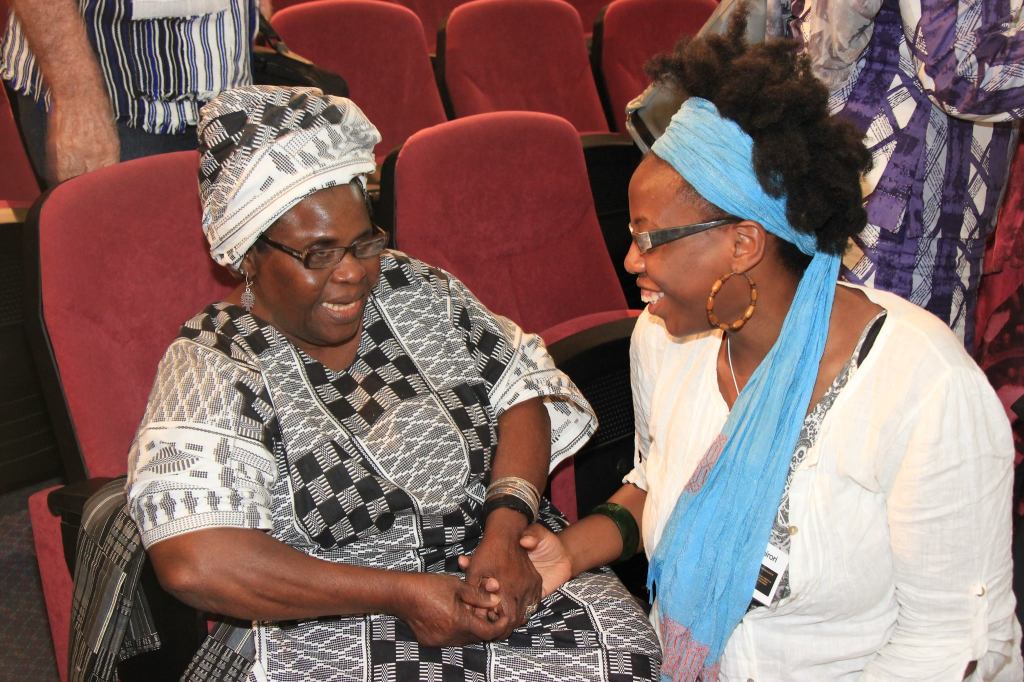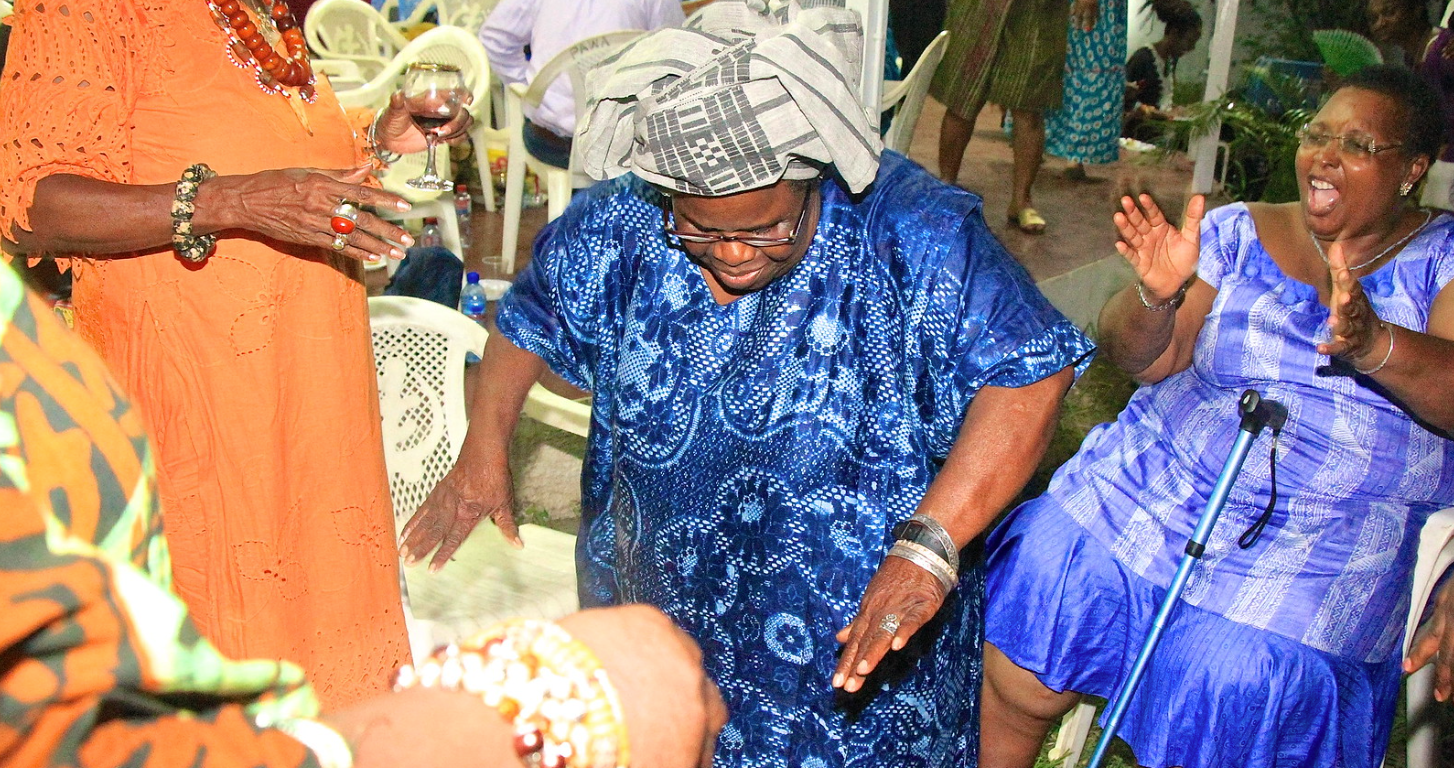It is a warm Accra evening in May. On every morning and afternoon of my almost two-week stay there, the weather is unbearably humid and close. And the only escape from it is the ubiquitous air conditioning. Air-conditioned buses. Air-conditioned hotels. Air-conditioned auditoriums.
But once the sun sets, the heat that it passes through the Atlantic Ocean begins to recede. A short reprieve. As if the spirits of the many ancestors lost to those waters settle for a fleeting peace.
We have been at this conference, the Yari Yari Ntoaso Conference for some days. We are a mix of women of African descent – poets, writers, intellectuals from the far flung corners of the continent and its diasporas – gathered together to discuss the different themes and urgencies of our work.
Ama Ata Aidoo is there with us.

It is a great privilege to be in her presence, as it is to be in the presence of all these other wondrous women. Many of us take naturally to calling her Aunty Ama.
One evening, a few of us go out to dinner, Aunty Ama with us. A waiter visits our table and lists off what the restaurant has on offer by way of food and drinks. With the quickness of a lifetime of experience, Aunty Ama points out to the waiter, perhaps in his 20s, that he has not mentioned a single alcoholic drink to us all, a group of adult women.
“Would you not offer us wine if we had men here?”
She asks the waiter too why he does not mention local meat dishes as part of the menu and remarks at the colonial conformity of spaces such as this, which should be highlighting the country’s local fare.
Obviously, the waiter is taken aback, not expecting such incisive and political commentary from a seemingly ‘sweet granny’ in her 70s.
Nonetheless, he rereads the menu, now including all the alcoholic beverages on offer. We get some bottles of wine for the table. She also discovers that they serve local meat and orders that as her meal.
What strikes me about her in that moment is that she embodies everything that I have looked up to in her work. Outspokenness. Determination. A willingness to challenge norms and speak back to them. Her voice and demeanour are small and gentle, but her words are – in no ways – small at all. Gentle, yes. But very clearly political.
I see this too in my own mother, a career woman who was the first black woman editor of a Zimbabwean newspaper in the 1990s. After making our purchases recently at a crafters’ market, the craftsmen proceeded to attempt to cram all of our products into one small bag.
“Stiiiiiiiingy!” my mother proclaimed quite seriously, but with a convivial smile.
It is always a moment of bewilderment for these young men when women as old as their own mothers speak so singularly and boldly. And it is a trait I have often found embarrassing, wishing she could be more like other mothers; more enduring and diplomatic in their silences about things.
But the older I too get, the more I realise that there is no peace or joy that comes from accepting disrespect; from reining one’s tongue to please people and systems that have no desire to change.
And so I become more grateful for these matriarchs. These soft-spoken outspoken women who continue to speak, even as they are weary and hoarse with the same declarations of their autonomy and power, and the autonomy and power of us, their daughters.
It is a warm Accra evening in May. It is the last day of our conference and we are all out for a party by the mild ocean waters; our farewell to each other. Sister Attillah is hard at work on the decks, headphones over her bundled dreadlocks, playing us music we all dance and nod our heads along to as we interact, taking in our togetherness one last time. Aunty Ama is sitting in her chair. The beats continue and she becomes more and more roused; more determined to dance along. She walks with the support of a cane so there are some technicalities involved in getting up to dance. Nonetheless, she begins to rest her weight forwards, using the cane as her anchor. She stands up to her full diminutive height.
She balances herself between her feet. Throws the cane aside. Begins to dance. Hands raised up. Shimmying up and down and sideways. We all cheer and shout, a ring of cheerleaders forming around her.
In that moment, I know I am exactly where I am supposed to be. I get out my camera to bear witness.
This is how I will remember Ama Ata Aidoo.
Dancing despite the obstacles.
Inimitable.
The life of the party.
Free.
——
My dear brother,
I have been to a cold strange land where dogs and cats eat better than many children;
Where men would sit at a table and eat with animals and yet would rather die than shake the hands of other men.
Where women who say they have no time to bear children and spoil their lives would sit for many hours and feed baby dogs delicate food with spoons, and make coats to cover the hairy animals from the same cloth they wear as sisters and brothers and friends in our village would do on festival occasions.
My brother, I have been to a land where they treat animals like human beings and some human beings like animals, because they are not
Dumb enough.
From ‘Our Sister Killjoy’ by Ama Ata Aidoo

